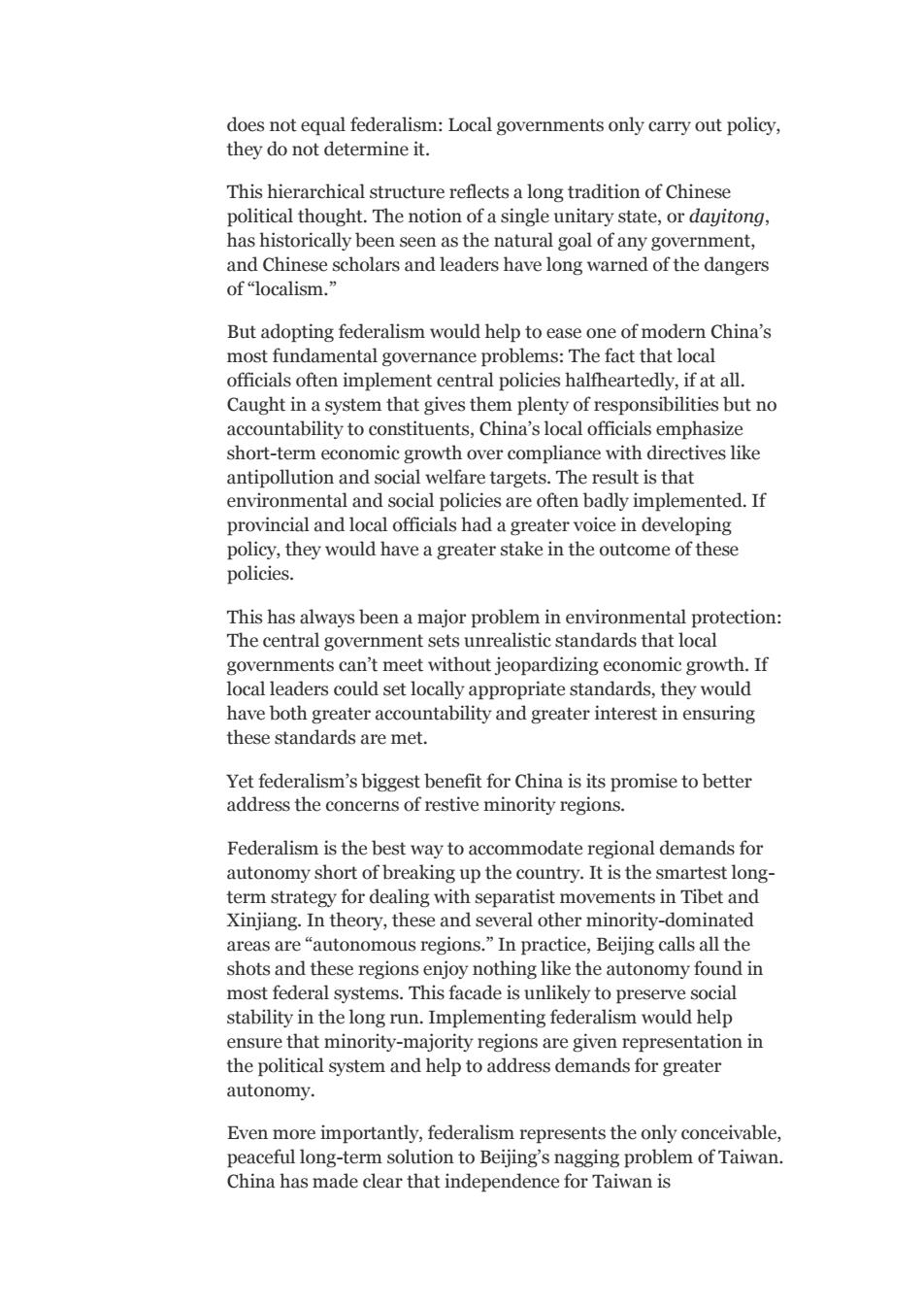正在加载图片...

does not equal federalism:Local governments only carry out policy, they do not determine it. This hierarchical structure reflects a long tradition of Chinese political thought.The notion of a single unitary state,or dayitong, has historically been seen as the natural goal of any government, and Chinese scholars and leaders have long warned of the dangers of"localism.” But adopting federalism would help to ease one of modern China's most fundamental governance problems:The fact that local officials often implement central policies halfheartedly,if at all. Caught in a system that gives them plenty of responsibilities but no accountability to constituents,China's local officials emphasize short-term economic growth over compliance with directives like antipollution and social welfare targets.The result is that environmental and social policies are often badly implemented.If provincial and local officials had a greater voice in developing policy,they would have a greater stake in the outcome of these policies. This has always been a major problem in environmental protection: The central government sets unrealistic standards that local governments can't meet without jeopardizing economic growth.If local leaders could set locally appropriate standards,they would have both greater accountability and greater interest in ensuring these standards are met. Yet federalism's biggest benefit for China is its promise to better address the concerns of restive minority regions. Federalism is the best way to accommodate regional demands for autonomy short of breaking up the country.It is the smartest long- term strategy for dealing with separatist movements in Tibet and Xinjiang.In theory,these and several other minority-dominated areas are"autonomous regions."In practice,Beijing calls all the shots and these regions enjoy nothing like the autonomy found in most federal systems.This facade is unlikely to preserve social stability in the long run.Implementing federalism would help ensure that minority-majority regions are given representation in the political system and help to address demands for greater autonomy. Even more importantly,federalism represents the only conceivable, peaceful long-term solution to Beijing's nagging problem of Taiwan. China has made clear that independence for Taiwan isdoes not equal federalism: Local governments only carry out policy, they do not determine it. This hierarchical structure reflects a long tradition of Chinese political thought. The notion of a single unitary state, or dayitong, has historically been seen as the natural goal of any government, and Chinese scholars and leaders have long warned of the dangers of “localism.” But adopting federalism would help to ease one of modern China’s most fundamental governance problems: The fact that local officials often implement central policies halfheartedly, if at all. Caught in a system that gives them plenty of responsibilities but no accountability to constituents, China’s local officials emphasize short-term economic growth over compliance with directives like antipollution and social welfare targets. The result is that environmental and social policies are often badly implemented. If provincial and local officials had a greater voice in developing policy, they would have a greater stake in the outcome of these policies. This has always been a major problem in environmental protection: The central government sets unrealistic standards that local governments can’t meet without jeopardizing economic growth. If local leaders could set locally appropriate standards, they would have both greater accountability and greater interest in ensuring these standards are met. Yet federalism’s biggest benefit for China is its promise to better address the concerns of restive minority regions. Federalism is the best way to accommodate regional demands for autonomy short of breaking up the country. It is the smartest longterm strategy for dealing with separatist movements in Tibet and Xinjiang. In theory, these and several other minority-dominated areas are “autonomous regions.” In practice, Beijing calls all the shots and these regions enjoy nothing like the autonomy found in most federal systems. This facade is unlikely to preserve social stability in the long run. Implementing federalism would help ensure that minority-majority regions are given representation in the political system and help to address demands for greater autonomy. Even more importantly, federalism represents the only conceivable, peaceful long-term solution to Beijing’s nagging problem of Taiwan. China has made clear that independence for Taiwan is